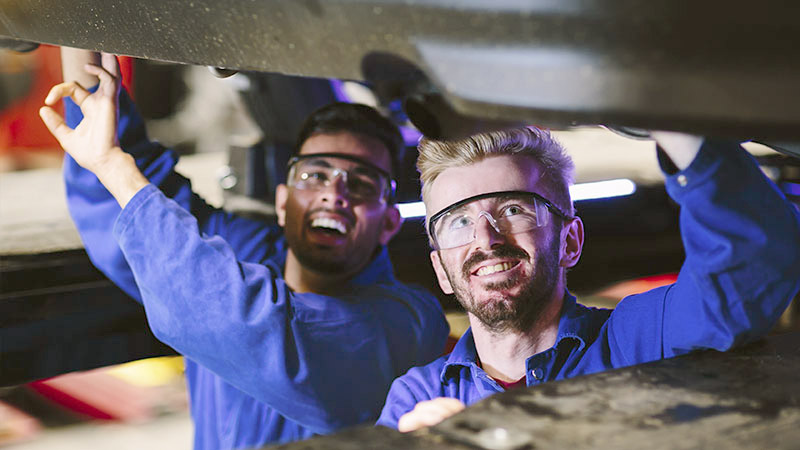

Graduates of this 2-year Diploma program will apply technical knowledge and skills to increase the power of diesel and automotive engines, enhance the performance of automobiles, and perform repair, service, and maintenance on high-performance vehicles.
High Performance and Custom Engine Technician

Info Week at VCC
Join us online or in-person for our info sessions, April 28 - May 2.
What you will learn
Upon successful completion of this program, graduates will be able to:
- Practice safety including complying with WorkSafe BC and WHMIS in the workplace.
- Apply employability and communication skills while working in a businesslike manner.
- Utilize hand, measuring, and power tools and shop equipment safely and effectively.
- Provide general automotive maintenance services with lubrication and fluids, belts and hoses, exterior lamps, exhaust system, tires and wheels.
- Assess, diagnose, and service gasoline and diesel engines and apply high performance modifications.
- Describe vehicle powertrain systems and explain high performance drive lines.
- Assess, diagnose, and service regular vehicle brake, suspension, and steering systems and apply high performance modifications.
- Describe, diagnose and repair electrical and engine management systems.
- Describe heating, ventilation and air conditioning systems.
- Assess, diagnose, and service vehicle trims.
- Describe new vehicle technology and hybrid and electric vehicles.
- Perform engine tuning and dynamometer testing.
What to expect
Program Duration and Maximum Time for Completion
This program is two years of full-time study. The maximum time to complete the program is 5 years.
Students will work in classroom and shop environments to gain the theoretical knowledge and hands on experience to succeed in the automotive technology industry. The initial courses focus on students learning and practicing tool kit use, identifying tools, mechanical technology as used on the shop floor, as well as understanding and identifying design structures of tools and technology. This will all be undertaken following the principles of safety and WHMIS. Once mastery of this is achieved, students will learn the theory and practice to the specific components of vehicle repairs.
Throughout the classroom experience students will learn through a variety of teaching and learning styles such as group work, presentations, lectures and examinations.
In the shop environment, students apply the theory they acquired in class to diagnose, service, and repair all components of vehicles through hands on-projects, tasks and assessments.
Admission requirements
Program-specific
- Grade 12 graduation or equivalent
- Composition 11 (English 11) or equivalent
- Apprenticeship and Workplace Math 10 or equivalent
General
- Seats are offered to applicants who have met all admission requirements, on a first-qualified, first-served basis.
- International applicants must be 17 years of age or older or a graduate of a secondary school. (Some exceptions may apply.)
- Applicants must submit official transcripts and educational documents as required by their course or program.
- All VCC applicants are required to function successfully in an English-speaking classroom. English requirements vary by program. For details, visit VCC International - English Requirements.
Recommended Characteristics
The program can be physically taxing, with students typically needing to stand on concrete floors for extended periods of time. Tasks require precise hand-eye coordination and dexterity for handling tools, instruments, and performing detailed procedures. Physical strength and stamina are involved with the handling of heavy parts and equipment as required by the program and in the field of practice.
The program environment will include regular exposure to loud machinery noise, power tools, and equipment vibrations. The learning environment involves regular exposure to automotive chemicals, including fuels, oils, lubricants, coolants, and cleaning agents. Work may also involve exposure to fumes, dust, and airborne particles from paints, solvents, and mechanical processes.
A valid driver’s license is necessary for the program segments that involve driving cars to and from their proper spaces. Basic computer applications will be used in the program.
Courses *
Classes are generally held 4 days a week, from 8 a.m. to 3 p.m. Class times are subject to change.
Prior learning assessment and recognition
Prior learning assessment and recognition is not available for this program.
* This information is intended as a guideline only. Program and course details are subject to change with the approval of VCC's Board of Governors.

Discover Open Studies
Open Studies lets you take courses from credit programs without having to be accepted into one. Based on availability, you can sample different courses, earn credits, and build new skills.
Explore your optionsFees and other costs *
Tuition deposits are payable usually within three weeks after a Letter of Offer is issued.
Tuition Deposit: $12,000 ($10,000 non-refundable).
Tution deposits are payable usually within two (2) weeks after a Letter of Offer is issued.
| Tuition Deposit |
$12,000 ($10,000 non-refundable) Tution deposits are payable usually within two (2) weeks after a Letter of Offer is issued. |
|---|
| Fee description | Fee Amount | Notes |
|---|---|---|
| Application fee | $145 | |
| Tuition Tuition | $37,206 | |
| Student union | $283 | |
| College initiative | $187 | |
| Materials | $657 | not including textbooks |
| Campus resource | $373 | |
| Laundry | $737 | |
| Coverall (deposit) | $85 | |
| Medical and Dental | $570 | |
| U-PASS | $658 | |
| Graduation | $45 | |
| Total | $40,946 |
This is an international cohort program. As international cohorts are exclusively for international students, international fees apply throughout the duration of the program
* Tuition and other fees are approximate and subject to increase up to 5% per year. Students will be required to pay increased rates if the fees change at any time during the period of enrolment in the program. Application and assessment fees are non-refundable.
Fees listed are for international students. For domestic programs, visit vcc.ca.
Any refunds are issued according to VCC's international refund policy.
Apply now
For more information and tips, see Apply page

Info Week at VCC
Join us online or in-person for our info sessions, April 28 - May 2.
Ask a question
- Step 1undefined
- Step 2undefined
